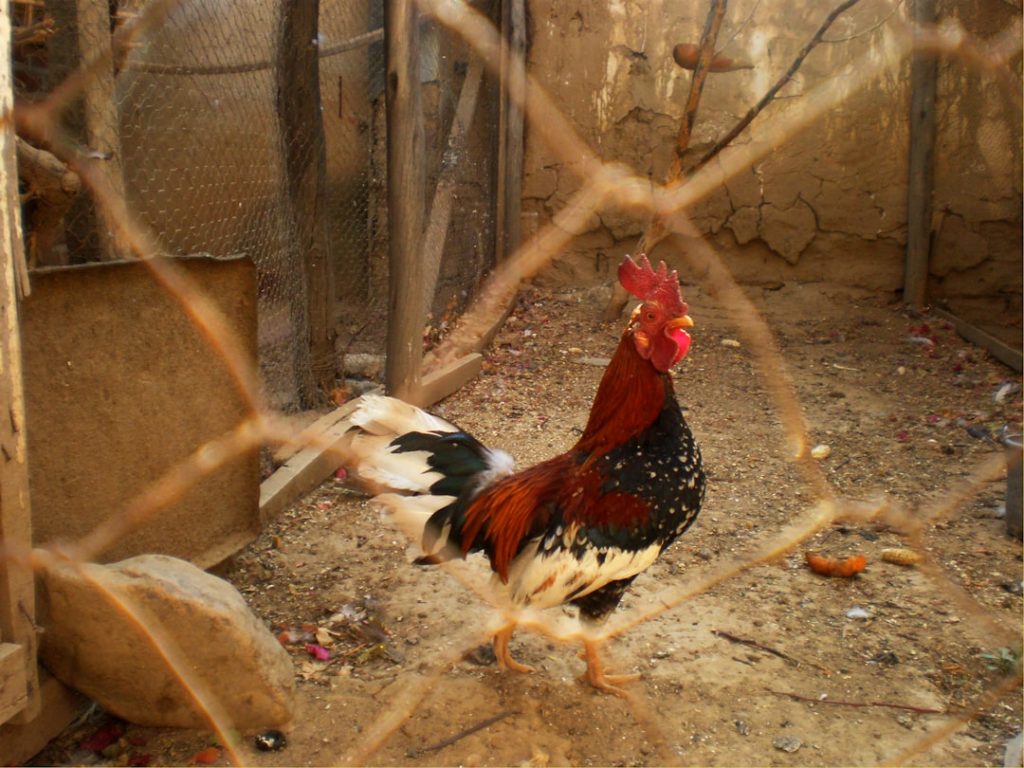Cats are curious, independent animals with natural hunting instincts that may be attracted to chickens as potential prey. They are territorial and might view a backyard with chickens as their hunting ground. Cats possess a keen sense of smell and are adept climbers, capable of scaling fences and barriers with ease.
Chickens are social, ground-dwelling birds that enjoy roaming and foraging in open spaces. They are easily startled by sudden movements or loud noises, making them vulnerable to predators like cats. Chickens prefer to peck for food on the ground and require space to engage in natural behaviors.
Understanding the behavioral characteristics of both cats and chickens is essential for assessing potential risks and implementing effective strategies to keep them separated. This knowledge allows for the development of suitable solutions to ensure the safety of both species when they share proximity in a domestic setting.
Table of Contents
- 1 Creating Physical Barriers to Keep Cats and Chickens Out
- 2 Using Repellents to Deter Cats and Chickens
- 3 Implementing Scare Tactics to Keep Cats and Chickens Away
- 4 Providing Alternative Areas for Cats and Chickens to Roam
- 5 Collaborating with Neighbors to Address the Issue
- 6 Seeking Professional Help if the Problem Persists
- 7 FAQs
- 7.1 What are some effective ways to keep cats out of the yard?
- 7.2 How can I deter chickens from entering my yard?
- 7.3 Are there any plants that can help keep cats and chickens out of the yard?
- 7.4 What are some humane ways to keep cats and chickens out of the yard?
- 7.5 Are there any commercial products available to keep cats and chickens out of the yard?
Key Takeaways
- Cats and chickens have different behaviors and motivations for entering certain areas
- Physical barriers such as fences and netting can effectively keep cats and chickens out of specific areas
- Repellents such as citrus peels and coffee grounds can deter cats and chickens from entering certain spaces
- Scare tactics like motion-activated sprinklers and noise devices can be effective in keeping cats and chickens away
- Providing alternative areas for cats and chickens to roam can help redirect their behavior away from unwanted areas
- Collaborating with neighbors can help address the issue of cats and chickens roaming into unwanted areas
- Seeking professional help, such as hiring a pest control service, may be necessary if the problem persists despite other efforts
Creating Physical Barriers to Keep Cats and Chickens Out
Installing Fences and Chicken Wire
One effective way to keep cats and chickens separated is by creating physical barriers in your backyard. This can include installing fences or chicken wire around the perimeter of the chicken coop or designated chicken area. Fences should be at least 6 feet high to prevent cats from jumping over them, and the chicken wire should be buried at least 6 inches into the ground to prevent cats from digging underneath.
Adding a Roof or Netting
Additionally, adding a roof or netting over the chicken area can further deter cats from accessing the chickens. This extra layer of protection can provide an added sense of security for your chickens.
Creating a Separate Enclosed Area
Another option is to create a separate enclosed area for the chickens to roam freely without the risk of cat attacks. This can be achieved by using chicken tractors or movable pens that can be placed in different areas of the backyard. These enclosures should be secure and predator-proof to ensure the safety of the chickens.
By creating physical barriers, you can effectively keep cats and chickens separated while allowing the chickens to still enjoy their natural behavior of foraging and roaming.
Using Repellents to Deter Cats and Chickens

Using repellents is another effective method to deter cats and chickens from crossing paths. There are various commercial repellents available that are specifically designed to deter cats from entering certain areas. These repellents often contain natural ingredients such as citrus, pepper, or vinegar, which cats find unpleasant and will avoid.
Additionally, motion-activated sprinklers can be used to startle cats when they approach the chicken area, deterring them from coming back. For chickens, using natural repellents such as garlic or herbs can help keep them safe from potential predators like cats. Planting these repellent herbs around the chicken coop or designated area can create a natural barrier that deters cats from approaching.
Additionally, using strong-smelling herbs or plants such as lavender or rosemary can help mask the scent of the chickens, making them less attractive to cats. By using repellents, you can create a natural deterrent that keeps both cats and chickens safe and separated.
Implementing Scare Tactics to Keep Cats and Chickens Away
Implementing scare tactics is another effective way to keep cats and chickens separated. For cats, using motion-activated devices that emit a sudden burst of air or sound when they approach the chicken area can startle them and deter them from coming back. Additionally, placing objects that move or make noise, such as wind chimes or aluminum foil, around the chicken area can help scare off cats.
For chickens, using scarecrows or other visual deterrents can help keep them safe from potential cat attacks. Placing scarecrows or reflective objects around the chicken coop or designated area can create a visual barrier that deters cats from approaching. Additionally, using predator decoys such as fake owls or snakes can help create a sense of danger for cats, keeping them away from the chickens.
By implementing scare tactics, you can effectively keep cats and chickens separated while ensuring the safety of the chickens.
Providing Alternative Areas for Cats and Chickens to Roam
Providing alternative areas for both cats and chickens to roam can help reduce the likelihood of them crossing paths. For cats, creating a designated outdoor space with climbing structures, hiding spots, and toys can help satisfy their natural hunting instincts and keep them entertained. This can help reduce their interest in hunting for small animals like chickens in the backyard.
For chickens, providing a spacious and secure outdoor area with plenty of room to roam and forage for food can help keep them safe from potential cat attacks. This can be achieved by using chicken tractors or movable pens that can be placed in different areas of the backyard, allowing the chickens to explore new environments while remaining safe from predators like cats. By providing alternative areas for both cats and chickens to roam, you can reduce the likelihood of them crossing paths and ensure their safety.
Collaborating with Neighbors to Address the Issue

Communicating with Cat Owners
If you have neighbors who own cats, it’s essential to communicate with them about the potential risks and find common solutions to keep both cats and chickens safe. This can include discussing ways to create physical barriers or using repellents to deter cats from entering your backyard.
Creating a Community Effort
Collaborating with neighbors who own chickens can help create a community effort in keeping both cats and chickens safe. By sharing information and resources, you can work together to find effective solutions that benefit both parties. This can include creating designated areas for chickens to roam without the risk of cat attacks or implementing scare tactics that deter cats from approaching the chicken areas.
Proactive and Cooperative Solutions
By collaborating with neighbors, you can address the issue of cats and chickens crossing paths in a proactive and cooperative manner.
Seeking Professional Help if the Problem Persists
If despite your best efforts, the problem of cats and chickens crossing paths persists, it may be necessary to seek professional help. This can include consulting with animal behaviorists or wildlife experts who specialize in finding solutions for keeping cats and chickens separated. These professionals can provide valuable insights and recommendations based on their expertise in animal behavior and predator-prey dynamics.
Additionally, seeking professional help may also involve contacting local animal control services or wildlife management agencies for assistance. These organizations may be able to provide guidance on legal measures that can be taken to address the issue, such as trapping and relocating nuisance animals or implementing community-wide initiatives to reduce cat populations in the area. In some cases, it may also be necessary to seek assistance from pest control professionals who specialize in humane methods of deterring cats from entering certain areas.
These professionals can provide tailored solutions that address the specific needs of keeping cats away from chickens while ensuring the safety and well-being of both animals. In conclusion, understanding the behavior of cats and chickens is crucial in finding effective ways to keep them separated. Creating physical barriers, using repellents, implementing scare tactics, providing alternative areas for both animals to roam, collaborating with neighbors, and seeking professional help are all important steps in addressing the issue of cats and chickens crossing paths.
By taking proactive measures and working together with others, it is possible to find solutions that ensure the safety and well-being of both cats and chickens in your backyard.
If you’re looking for ways to keep cats and chickens out of your yard, you may also be interested in learning about how long it takes for chicken eggs to hatch naturally. Check out this article for more information on the hatching process and how to care for your chicks once they’ve hatched.
FAQs
What are some effective ways to keep cats out of the yard?
Some effective ways to keep cats out of the yard include using motion-activated sprinklers, citrus peels or sprays, and installing physical barriers such as fences or chicken wire.
How can I deter chickens from entering my yard?
To deter chickens from entering your yard, you can use chicken wire or netting to create a barrier, use natural deterrents such as predator decoys or reflective objects, and keep food sources out of reach.
Are there any plants that can help keep cats and chickens out of the yard?
Plants such as lavender, rosemary, and rue are known to repel cats, while plants with prickly leaves or strong scents like marigolds and citronella can help deter chickens.
What are some humane ways to keep cats and chickens out of the yard?
Humane ways to keep cats and chickens out of the yard include using natural deterrents, creating physical barriers, and providing alternative spaces for the animals to roam and explore.
Are there any commercial products available to keep cats and chickens out of the yard?
Yes, there are commercial products such as ultrasonic repellents, motion-activated sprinklers, and natural sprays that are specifically designed to keep cats and chickens out of yards and gardens.
Meet Walter, the feathered-friend fanatic of Florida! Nestled in the sunshine state, Walter struts through life with his feathered companions, clucking his way to happiness. With a coop that’s fancier than a five-star hotel, he’s the Don Juan of the chicken world. When he’s not teaching his hens to do the cha-cha, you’ll find him in a heated debate with his prized rooster, Sir Clucks-a-Lot. Walter’s poultry passion is no yolk; he’s the sunny-side-up guy you never knew you needed in your flock of friends!







